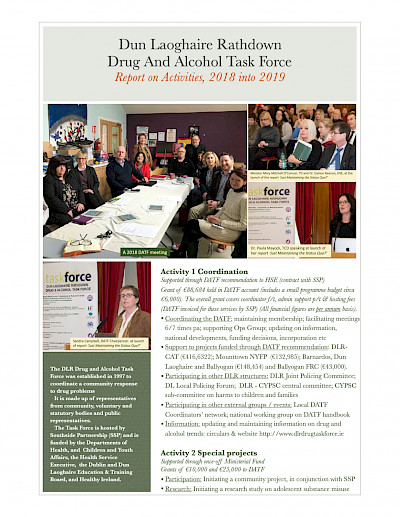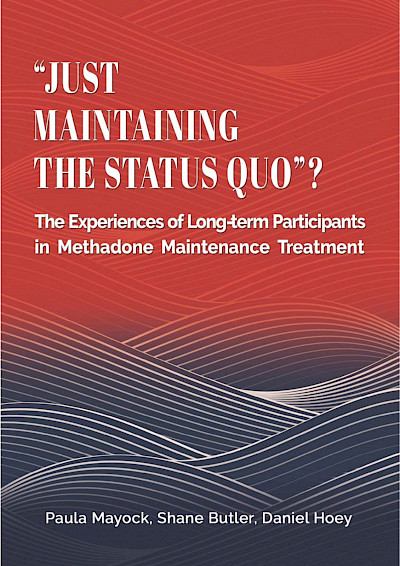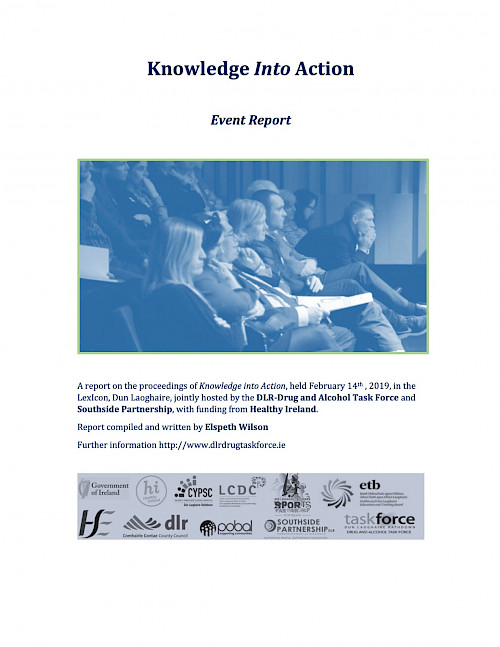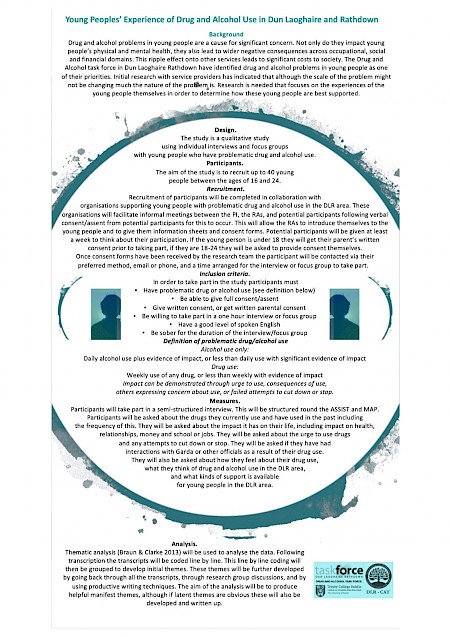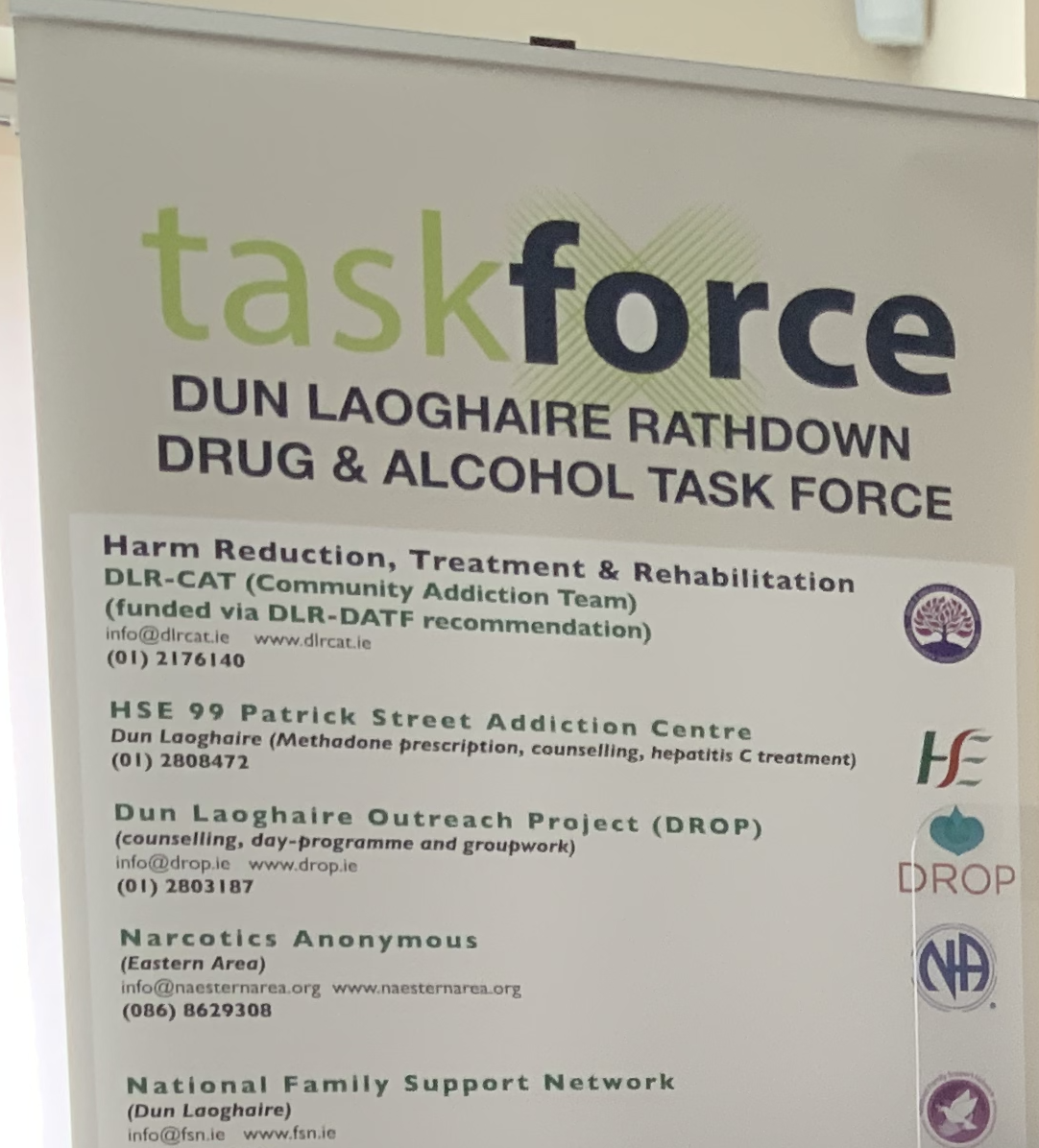Research, development and training
This programme is focused on supporting community members, projects and personnel in the field of substance misuse, through inter-agency training and seminars, research and other development activities.
The Task Force produces occasional progress reports, with the latest being the Progress reports on 2018-2019 activities.
The current (2020-22) programme of activities include:
Hidden harms - Information protocol
In February 2019 the DLR-DATF hosted an event - Knowledge into Action (KIA) – that included a workshop on the joint HSE / Tusla Hidden Harms Framework (HHF), which was launched in January 2019. The Framework seeks to address hidden harms to children arising from substance misuse by their parents or carers. There will be a national roll-out of HHF, and at a local level agencies and services in the field are encouraged to come together to develop bottom-up collaborative initiatives to support its implementation.
Following the KIA event, the Task Force linked with the Túsla’s Prevention, Partnership and Family Support Programme and recruited field personnel to come together to develop a 3-year programme, specifically focused on HHF’s local, county-wide implementation.
During 2019 two seminars were held that brought together personnel from both Drug and Alcohol Services and from Children and Family Support Services, straddling both statutory and community/voluntary service providers.
The group have put together a series of ideas and proposed actions for the period 2020-2022, which are available at the following link.
Engaging service participants
With the assistance of CAN (Community Action Network), the Task Force commenced an exercise for engaging service participants. Following a series of planning events and discussions it decided to combine this exercise with a dissemination of “Just Maintaining the Status Quo”? a report on a study of older participants on methadone maintenance treatment programmes, in the DLR area, which was published in December 2018.
During 2019 it held an initial dissemination exercise as one part of a conference titled Knowledge into Action.
During 2020, the Task Force will be disseminating the report’s findings through a series of half-day workshops for service participants, practice personnel and policy makers within the drug treatment field. Initially these workshops were scheduled to commence in March 2020 but arising from COVID-19 they will be re-scheduled. Further information to follow:
The purpose of these dissemination exercises will be:
- To explain the report’s findings to service users and others
- To get people more engaged with the report
- To create better understanding of the report
- To generate discussion about the report
- To begin to think about the report and how it might be used to develop and improve services
Download your copy of the report: “Just Maintaining the Status Quo”?
In addition the authors of "Just Maintaining the Status Quo" published two academic articles in international publications, which are available through these links
Download your copy of the Research Briefing on the report “Just Maintaining the Status Quo”?
Download your copy of a report on Knowledge into Action
Youth substance misuse research project
Research Project: Young Peoples’ Experience of Drug and Alcohol Use in Dun Laoghaire and Rathdown.
This study is being conducted by a research team from the School of Psychology (Trinity College). The project commenced in February 2020, but before data collection commenced, it was paused, arising from COVID-19. It will recommence in Sept/October 2020, subject to public health guidance. Ethical approval for the study was granted through the School of Psychology’s Research Ethics Committee.
It will be a qualitative study using individual interviews and focus groups with young people, aged 16-24, who have problematic drug and alcohol use.
Frontline youth service managers and personnel have been approached and participated in briefing workshops during February 2020, in order to seek their assistance in identifying and recruiting prospective research participants.
Further information on the study’s commencement will be posted in due course.
Read the Research protocol document.
Post COVID-19: Service adjustments
As people across Ireland come to terms with COVID-19, personnel in drug treatment services are aware that the disease could, potentially, have a deep impact on both the services and service users, particularly in relation to service structures, more focused harm reduction strategies, a strengthening of advocacy, and the need to maintain and update relevant information from government, media and other sources. More information available here.

